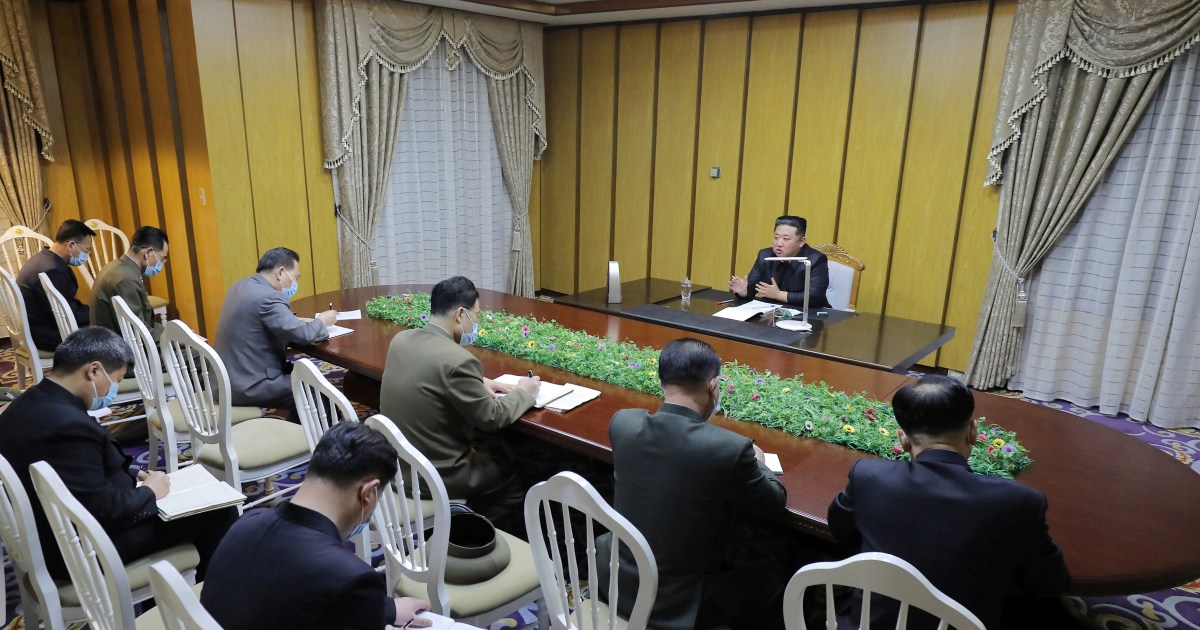North Korea confirms first COVID death; 350,000 reporting ‘fever’
Experts worry North Korea’s health system will be unable to cope with COVID outbreak among an unvaccinated population.
North Korea has confirmed its first COVID-19 death, and says hundreds of thousands of people have “fever”, in the first indication of the scale of the outbreak in its largely unvaccinated population.
The nuclear-armed country announced on Thursday its first coronavirus outbreak since the pandemic began, moving into lockdown after people in the capital, Pyongyang, tested positive for the Omicron variant.
“A fever whose cause couldn’t be identified explosively spread nationwide from late April,” the official Korean Central News Agency said on Friday.
“Six persons died (one of them tested positive for the BA.2 sub-variant of Omicron),” it added.
About 350,000 people have shown signs of “fever”, while 187,800 people are being treated in isolation, according to KCNA.
Experts worry North Korea’s crumbling health system will be unable to cope with the spread of COVID-19 given that its 26 million people have not been vaccinated against the virus after Pyongyang rejected millions of doses offered under the WHO-led COVAX programme.
“With the first official news of a COVID-19 outbreak in the country, continuing on this path could cost many lives and would be an unconscionable dereliction of upholding the right to health,” Amnesty International’s East Asia Researcher Boram Jang said in a statement.
Many North Koreans are also in poor health as a result of food shortages and malnutrition, making it more difficult for their immune systems to fight the disease.
North Korea was ranked 193 of 195 countries in its capability to cope with a healthcare crisis in a 2019 study of epidemic preparedness conducted by the Johns Hopkins Center for Health Security.
“It is vital that the government acts now to protect the right to health of one of the world’s populations with lowest access to vaccines and one of its most fragile health systems. That means providing access to vaccines without discrimination and guaranteeing a transparent vaccine distribution plan which is subject to public scrutiny,” Jang said.
Leader Kim Jong Un – seen wearing a mask on state TV for the first time – has declared a “gravest state of emergency” and ordered nationwide lockdowns in an attempt to halt the spread of the virus.
KCNA said Kim was briefed about the outbreak during a visit to the state emergency epidemic prevention headquarters on Thursday where he criticised officials for their management of the outbreak.
“It is the most important challenge and supreme tasks facing our party to reverse the immediate public health crisis situation at an early date, restore the stability of epidemic prevention and protect the health and wellbeing of our people,” KCNA quoted Kim as saying.
North Korea has said the outbreak began in the capital of Pyongyang in April.
While state media did not elaborate on the cause of the outbreak, the city hosted several massive public events that month, including a military parade and large gatherings where most people did not wear masks.
“Holding a military parade attended by a large crowd, when Omicron was raging in neighbouring China, shows Pyongyang was overconfident in their capabilities to fight and prevent the virus,” Cheong Seong-chang of the Sejong Institute told the AFP news agency.
North Korea was likely to see “major chaos” due to the rapid spread of Omicron, he said, given that the country is currently reporting nearly 20,000 cases in a single day.
“If the death toll from Omicron spikes, Pyongyang may have to ask for China’s support,” he added.
China, Pyongyang’s main ally, is trying to stamp out dozens of outbreaks of the coronavirus and has enforced lockdowns and restrictions in cities including Dandong, the main crossing point to North Korea.
It said on Thursday it was ready to provide assistance. Pyongyang previously rejected its offer to send vaccines.




